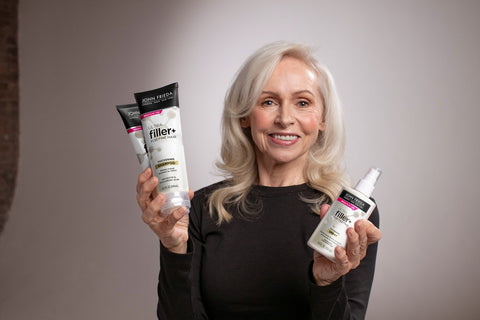Menopausal Hair Loss: Treatment & Solutions

Hair loss can be unsettling and a huge confidence-buster. But you're not alone in this journey. Understanding the bodily changes that come with this stage of life is the first step in effectively managing menopausal hair loss. This guide will explain how to treat and prevent menopausal hair loss so you can confidently embrace this new phase of life.
Symptoms of Menopausal Hair Loss
Identifying the signs of hair loss early can help you take proactive steps to manage menopausal hair loss. Here's what to look out for:
- Hair thinning: Pay attention to hair thinning at the top or sides of your scalp. This includes identifying any hair part that seems to widen over time.
- Hair shedding: Increased hair shedding on your pillow, in the shower, or your hairbrush are also symptoms.
- Nutritional deficiencies: A lack of vitamins like B12, biotin, and riboflavin can also contribute to hair loss.
While the idea of hair loss can be worrying, remember that a balanced diet and attentive hair care can reduce hair breakage and enhance your hair's vitality. If you're experiencing changes in your hair, consulting a healthcare professional can provide crucial insights and reassurance; they can conduct thorough examinations, like scalp checks, to understand and address the underlying issues.
Remember, you can manage these changes and maintain your hair's vitality, even during menopause.
Menopausal Hair Loss Treatment
Most of us can't truly prevent menopause--nature is going to do its thing. The good news is that there are several ways to treat and prevent menopausal hair loss and work to thicken your hair.
At-Home Menopausal Hair Loss Solutions
Several at-home solutions can help alleviate hair loss. In this section, we'll discuss practical ways to combat menopausal hair loss and promote healthy hair growth at home.
- Eat a balanced diet: A diet full of protein, fruits, and vegetables will provide your body with essential nutrients to support healthy hair growth. You can take a CBC (complete blood count) test and tailor your diet to address deficiencies.
- Stay hydrated: Drinking enough water is crucial for hair growth. Dehydration can lead to dry, brittle hair that is prone to breakage.
- Use the right products: Our hair changes and may require different products as we age. Look for shampoos and conditioners specifically formulated for thinning hair. Avoid harsher chemicals that may damage your hair and opt for ingredients specifically designed for fine, thin hair. Some natural ingredients have been found to help as well.
- Massage your scalp: Massaging your scalp can help stimulate blood flow and promote hair growth. You can do this with your fingers or use a scalp massager tool designed specifically for this purpose.
- Take supplements: Certain supplements like biotin, collagen, and omega-3 fatty acids have been shown to improve hair health and promote growth. Consult with your doctor before taking any supplements.
- Reduce stress: Stress can exacerbate hair loss, so finding ways to relax and de-stress is important. Consider mindfulness practices, yoga, or simply engaging in activities you enjoy.
- Exercise regularly: Physical activity can improve overall health, including hair health, by boosting circulation and reducing stress.
- Haircut and hair care: A haircut that adds volume and a gentle hair care routine can make a big difference in your hair's appearance. Changing your cotton pillows to satin ones can help keep your hair healthy and reduce breakage.
- Volumizing products: Volumizing products can give your hair a fuller look. Using volumizing sprays at the roots can gently lift your hair, offering a more voluminous appearance. These sprays, along with thickening shampoos and conditioners, work by cleansing and coating each strand, effectively enhancing your hair's thickness and overall health.
Professional Menopausal Hair Loss Solutions

Many menopausal hair loss solutions require professional assistance. First, you should consult a healthcare provider to ensure that you receive a comprehensive treatment plan that's right for you. Here are some hair loss solutions a medical professional may provide:
- Topical solutions: Topical solutions prescribed by healthcare professionals typically include minoxidil, which can effectively promote hair growth during menopause. These are designed to stimulate hair growth and directly improve scalp health.
- Laser hair therapy: This non-invasive treatment can stimulate hair follicles. It's often used with other treatments and is particularly effective for those in the early stages of hair thinning.
- Prescribed medications or supplements: Your doctor might recommend certain medications or supplements to combat hair loss. Common supplements include iron, vitamin D, B vitamins, and omega-3 and omega-6 fatty acids.
Remember, while these treatments can be effective, they work best when tailored to individual needs and circumstances.

Other Causes of Hair Loss in Women
Hair loss during menopause is just one piece of a larger puzzle. While menopause can play a significant role, it's not the only cause. Women experience hair thinning for various reasons, and menopause often coincides with other changes that can influence hair health.
Other common causes include:
- Genetics: Factors include female-pattern hair loss, which might have been subtle earlier in life.
- Stress: Stress triggers hormonal imbalances in the body, which can result in increased hair shedding and noticeable thinning.
- Medical conditions: Thyroid disorders, autoimmune diseases, and hormonal imbalances can lead to hair loss in women by affecting the normal hair growth cycle.
- Nutritional changes: Lack of nutrients such as iron, vitamin B (particularly biotin), protein, and omega-3 fatty acids can also lead to hair thinning.
Key Takeaways
Menopausal hair loss isn't necessarily permanent. Hair loss treatment depends on various factors, like the cause of hair loss, overall health, and how well the body responds to different treatments. With proper care, you can combat hair loss symptoms from menopause and still achieve the full hair you love.



















